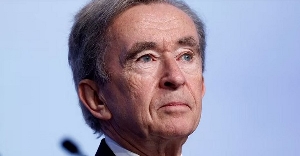The net worth of the world’s leading luxury billionaires has taken a substantial hit, collectively losing $24 billion due to a decelerating market for high-end goods. This downturn has notably impacted industry giants such as Bernard Arnault, Françoise Bettencourt Meyers, and François Pinault.
Bernard Arnault, the 75-year-old founder of LVMH, has been dethroned from his top spot on the Bloomberg Billionaires Index. Françoise Bettencourt Meyers, the heiress to the L’Oréal fortune, briefly relinquished her title as the world’s richest woman to Alice Walton of Walmart Inc., underscoring the volatility of luxury wealth in the current market. François Pinault’s net worth has also suffered.
Arnault’s wealth decreased by $10.8 billion over the past year, now standing at $197 billion, trailing behind Tesla’s Elon Musk and Amazon’s Jeff Bezos. LVMH, a conglomerate of 75 brands including Christian Dior, Tiffany & Co., and Hennessy Cognac, reported slower sales growth for fashion and leather goods in the first quarter and an overall decline in Asia, excluding Japan.
Bettencourt Meyers’ fortune has dropped by $9.74 billion to approximately $89.9 billion from a peak of $100 billion. Her stake in L’Oréal, which includes high-end brands like Aesop and Yves Saint Laurent as well as mass-market lines such as L’Oréal Paris and Maybelline, is under pressure due to a slowdown in China. L’Oreal share price crashed by 10% year to date.
The most dramatic decline has been seen in Pinault’s fortune, which has halved to $27.6 billion year-to-date, a $7.8 billion loss. Kering, managed by his son François-Henri Pinault, expects a significant profit decline in the first half of the year as its flagship brand, Gucci, faces challenges.
French companies under their control have also been impacted by investor apprehension following President Emmanuel Macron’s snap election, which resulted in a hung parliament and no clear government.
The decline in fortunes is not uniform across the luxury sector; it varies depending on brand popularity and exclusivity.
What to know
The onset of the earnings season has highlighted the sector’s challenges. Burberry Group Plc is grappling with an escalating crisis, while Swatch Group AG has reported significant sales declines. Later this month, industry giants such as L’Oreal and LVMH are slated to release their financial results, expected to shed further light on the sector’s struggles.
According to the Bloomberg Billionaires Index, the net worth of several ultra-wealthy individuals, particularly those tied to the luxury market, has declined by approximately 5%. This stands in stark contrast to the broader index, encompassing 500 of the world’s richest people, which has surged by 13%, marking a staggering $1 trillion increase—the largest such disparity since May 2022.
Despite these challenges, some luxury billionaires have shown resilience. The Wertheimer brothers, owners of Chanel, and Johann Rupert of Richemont have reported growth. Chanel achieved double-digit growth last year, while Richemont demonstrated resilience with increased sales from jewelry brands like Cartier, despite a 27% revenue drop in China.
However, investor sentiment remains cautious. Shares of LVMH, L’Oreal, and Kering declined in Paris trading on Tuesday, influenced by Burberry’s profit warning, executive changes, and Swatch Group’s disappointing sales performance.
Business News of Wednesday, 17 July 2024
Source: nairametrics.com













